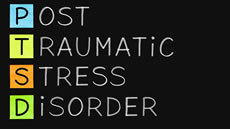
Understanding PTSD
Post -Traumatic Stress Disorder, or PTSD, is a serious and common condition that affects up to 20% of American adults. Although it is not confirmed what causes people to develop PTSD, it is common for biological, psychological, and social factors to play a part in its development. Individuals who are at a greater risk for developing PTSD are survivors of domestic or physical violence, survivors of unexpected events like accidents and natural disasters, combat veterans, abused children, and professions that require people to respond to victims in trauma situations. For those who do develop PTSD, highly distressing memories do not fade away and can cause feelings of intense fear, helplessness, or horror that impairs long-term emotional, mental, and physical well-being. The effects of PTSD can be so strong that it disables the person from being able to cope or function.
Symptoms of PTSD can become noticeable as soon as a few weeks after the traumatic event, but for others the feelings of dread or fear don’t become apparent for months or even years later. Symptoms of PTSD are broken into three clusters or categories. If someone has been experiencing severe distress in daily life or has been experiencing symptoms from each of the three categories for more than one month, then a reasonable diagnosis for PTSD can be made. PTSD can affect all five of the senses - sight, taste, touch, smell, and hearing. It can also occur along with depression, anxiety, or substance abuse. If you or someone you love has PTSD, remember that help is available. PTSD is treatable.
The Three Categories of PTSD:
- Re-experiencing symptoms – living the event through recurring nightmares or other images that intrude at any time. PTSD sufferers may have heart palpitations or panic when faced with reminders of the event.
- Avoidance and numbing symptoms – avoiding reminders of the event, including places, people, or associated thoughts. People with PTSD may withdraw emotionally from friends and family and lose interest in every day common activities.
- Arousal symptoms – including sudden anger or irritability, difficulty sleeping or concentrating, or being easily startled.
What Can You Do Right Now?
- Positive self-talk in stressful situations: Remind yourself that you can leave if you need to. You can make different choices in the present moment that are different from the ones when the trauma occurred.
- De-sensitize yourself to stressors: When feeling anxious, allow yourself to feel the anxiety for a moment and then remove yourself from experiencing the stressor. By building up tolerance, you will de-sensitize your feelings while still feeling in control.
- Tell friends and family how to support you: PTSD affects the whole family. Learn how to understand and share your feelings about the trauma so they can give support where its needed.
- Recognize when you need help: It is ok to not have it all together. You may feel guilty or isolated, but if symptoms aren’t going away, reach out for help. Therapy works.
- Find the right therapist: Look for a therapist with training and experience in treating PTSD. Find someone who is supportive and goal-oriented. Don’t forget to ask about availability, fees, and health insurance regulations.
CounselingCalifornia.com is a California-wide interactive, online directory that is user-friendly and searchable by name, location, and area of expertise. It’s your introduction to one or more qualified psychotherapists who hold a California License.
Find a Therapist
Back